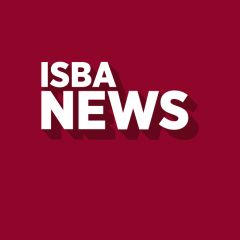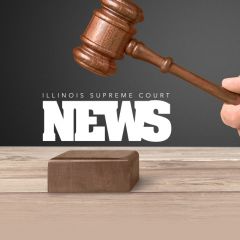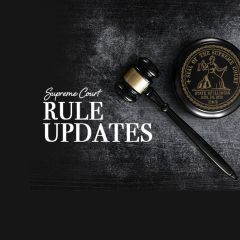The Illinois Supreme Court has appointed Drinda L. OConnor of Springfield to serve as a Commissioner of the Attorney Registration & Disciplinary Commission (A.R.D.C.) effective on January 1, 2021, and expiring on December 31, 2023. The A.R.D.C. is the Supreme Court agency that investigates allegations of lawyer wrongdoing in Illinois.
ISBA members, sign up to receive The Bar News' biweekly e-newsletter by emailing emailpreferences@isba.org
-
December 15, 2020 |
Practice News
-
December 15, 2020 |
Member Services
The Illinois State Bar Association’s Lawyer Finder Service provides referrals to local lawyers Mondays through Fridays. The Service makes referrals in a number of areas of law. For the month of November 2020 there were more than 400 referrals given. Here are the results for November 2020:
-
December 14, 2020 | Practice News
 COVID-19 has brought new issues and questions to light when it comes to employment law. Do employers have a duty to protect their employees from viral diseases such as COVID-19? When it comes to employment law, one typically can recover under workers’ compensation. But the Workers’ Compensation Act limits the amount of damages employees can recover from employers—even when these damages are often not enough. In their December 2020 Illinois Bar Journal article, “Workers’ Comp, Negligence, and COVID-19,” past ISBA President Hon. Russell W. Hartigan (ret.) and Sarah Norkus examine how Illinois courts have held that employers must provide employees with a reasonably safe place in which to work and use reasonable care to provide for their employees’ safety. However, relying upon the Act to collect COVID-19-related damages will not be easy. And other routes may be worth pursuing when seeking negligence-related injuries on the job before moving ahead with a workers’ compensation claim.
COVID-19 has brought new issues and questions to light when it comes to employment law. Do employers have a duty to protect their employees from viral diseases such as COVID-19? When it comes to employment law, one typically can recover under workers’ compensation. But the Workers’ Compensation Act limits the amount of damages employees can recover from employers—even when these damages are often not enough. In their December 2020 Illinois Bar Journal article, “Workers’ Comp, Negligence, and COVID-19,” past ISBA President Hon. Russell W. Hartigan (ret.) and Sarah Norkus examine how Illinois courts have held that employers must provide employees with a reasonably safe place in which to work and use reasonable care to provide for their employees’ safety. However, relying upon the Act to collect COVID-19-related damages will not be easy. And other routes may be worth pursuing when seeking negligence-related injuries on the job before moving ahead with a workers’ compensation claim. -
December 14, 2020 | ISBA News
 In an effort to address the ongoing shortage of attorneys practicing in rural Illinois, the ISBA has launched the Rural Practice Fellowship Program. The aim of the program is to connect rural and small-town law firms looking to hire law clerks and associates with law students and newer attorneys interested in practicing law in rural areas of Illinois.
In an effort to address the ongoing shortage of attorneys practicing in rural Illinois, the ISBA has launched the Rural Practice Fellowship Program. The aim of the program is to connect rural and small-town law firms looking to hire law clerks and associates with law students and newer attorneys interested in practicing law in rural areas of Illinois. -
December 11, 2020 | Practice News
 The Illinois Supreme Court’s Volunteer Pro Bono Program for Criminal Appeals recently expanded statewide to include cases in all five appellate districts.
The Illinois Supreme Court’s Volunteer Pro Bono Program for Criminal Appeals recently expanded statewide to include cases in all five appellate districts. -
December 9, 2020 | Practice News
 The Illinois Supreme Court has amended Rules 529, 530, and 531, by adding the following language to each Rule: “Per the Act, only one scheduled assessment shall be applied regardless of the number of citations issued and prosecuted together.”
The Illinois Supreme Court has amended Rules 529, 530, and 531, by adding the following language to each Rule: “Per the Act, only one scheduled assessment shall be applied regardless of the number of citations issued and prosecuted together.” -
December 9, 2020 | Practice News
 Chief Justice Anne M. Burke and the Illinois Supreme Court announced today the approval of new Rule 14, which will facilitate the expansion of text messaging in Illinois courts by authorizing any Illinois court or county clerk to implement a text message notification program. New Rule 14 is effective immediately. The Illinois Supreme Court Rules can be found online.
Chief Justice Anne M. Burke and the Illinois Supreme Court announced today the approval of new Rule 14, which will facilitate the expansion of text messaging in Illinois courts by authorizing any Illinois court or county clerk to implement a text message notification program. New Rule 14 is effective immediately. The Illinois Supreme Court Rules can be found online. -
December 9, 2020 | CLE
 Join us from noon until 1 p.m. on Thursday, January 7 for "Illinois’ Secure Choice Act: Requirements & Penalties for Retirement Plans." Get the information you need to effectively advise your clients on how the Illinois Secure Choice Act fills a void for employers who don’t want to administer their own retirement plan for employees. Corporate law attorneys, employee benefits lawyers, general practitioners, and any attorney who advises companies on the employment law aspects of their business who attend this online seminar will better understand: what the Illinois Secure Choice Act is and it’s requirements; the financial penalties for not making the Secure Choice Savings Program available to employees if a retirement plan is not being offered; how the program helps Illinois employees save for retirement and avoid living their retirement years in poverty; how the Secure Choice Act Program was implemented; the number of Illinois citizens who have enrolled in the program so far, as well as the plan assets of participants; and the potential legal problems the program could face.
Join us from noon until 1 p.m. on Thursday, January 7 for "Illinois’ Secure Choice Act: Requirements & Penalties for Retirement Plans." Get the information you need to effectively advise your clients on how the Illinois Secure Choice Act fills a void for employers who don’t want to administer their own retirement plan for employees. Corporate law attorneys, employee benefits lawyers, general practitioners, and any attorney who advises companies on the employment law aspects of their business who attend this online seminar will better understand: what the Illinois Secure Choice Act is and it’s requirements; the financial penalties for not making the Secure Choice Savings Program available to employees if a retirement plan is not being offered; how the program helps Illinois employees save for retirement and avoid living their retirement years in poverty; how the Secure Choice Act Program was implemented; the number of Illinois citizens who have enrolled in the program so far, as well as the plan assets of participants; and the potential legal problems the program could face. -
December 8, 2020 | Practice News
 On December 4, 2020, after his November 3, 2020 election, Justice Neville, the second African American to sit on the Illinois Supreme Court, was sworn in by Chief Justice Anne M. Burke, with his wife and staff in attendance.
On December 4, 2020, after his November 3, 2020 election, Justice Neville, the second African American to sit on the Illinois Supreme Court, was sworn in by Chief Justice Anne M. Burke, with his wife and staff in attendance. -
December 7, 2020 | Practice News
 In their December 2020 Illinois Bar Journal article, attorneys Andrew R. Schwartz and John Cerney present the following scenario: Without first consulting its lawyers, your firm’s major client, Hapless Client, LLC, entered into a horrible one-sided contract with Sketchy Business, Inc. To make matters worse, Sketchy just filed a contract claim against Hapless to enforce that contract, and Sketchy’s complaint seeks massive damages that could put Hapless out of business permanently. An interview with Hapless confirms the truth of the essential allegations of the complaint. Since the complaint states a viable claim, a motion to dismiss will fail. Litigation might buy Hapless some time, but Sketchy will likely win on summary judgment. Settlement appears doubtful: Sketchy knows the strength of its case, and its settlement demand exceeds Hapless’ ability to pay. You know this desperate situation will require creative thinking and, lo and behold, your research about Sketchy shows that it has a long and colorful history in the courts, including an unsatisfied adverse judgment in favor of J. Creditor, LLC. Here, a rather unusual strategy presents itself: Purchase J. Creditor’s judgment against Sketchy. With that judgment, Hapless can then seize Sketchy’s claim, i.e. its “chose in action” against Hapless. Schwartz and Cerney outline precisely how this maneuver works (and is one based on the authors’ real-life experience).
In their December 2020 Illinois Bar Journal article, attorneys Andrew R. Schwartz and John Cerney present the following scenario: Without first consulting its lawyers, your firm’s major client, Hapless Client, LLC, entered into a horrible one-sided contract with Sketchy Business, Inc. To make matters worse, Sketchy just filed a contract claim against Hapless to enforce that contract, and Sketchy’s complaint seeks massive damages that could put Hapless out of business permanently. An interview with Hapless confirms the truth of the essential allegations of the complaint. Since the complaint states a viable claim, a motion to dismiss will fail. Litigation might buy Hapless some time, but Sketchy will likely win on summary judgment. Settlement appears doubtful: Sketchy knows the strength of its case, and its settlement demand exceeds Hapless’ ability to pay. You know this desperate situation will require creative thinking and, lo and behold, your research about Sketchy shows that it has a long and colorful history in the courts, including an unsatisfied adverse judgment in favor of J. Creditor, LLC. Here, a rather unusual strategy presents itself: Purchase J. Creditor’s judgment against Sketchy. With that judgment, Hapless can then seize Sketchy’s claim, i.e. its “chose in action” against Hapless. Schwartz and Cerney outline precisely how this maneuver works (and is one based on the authors’ real-life experience).

